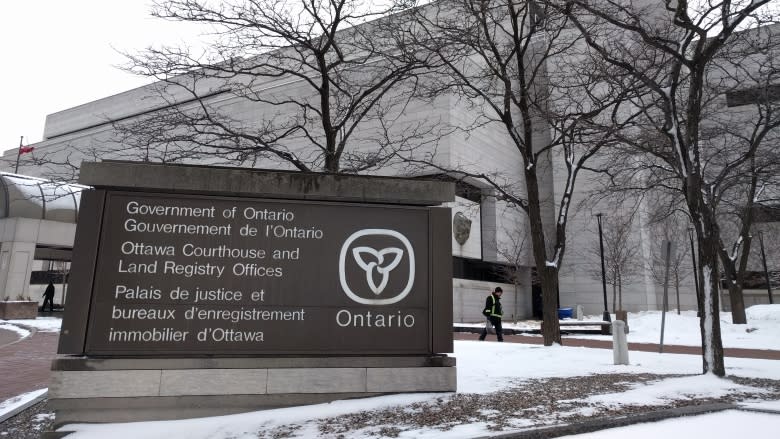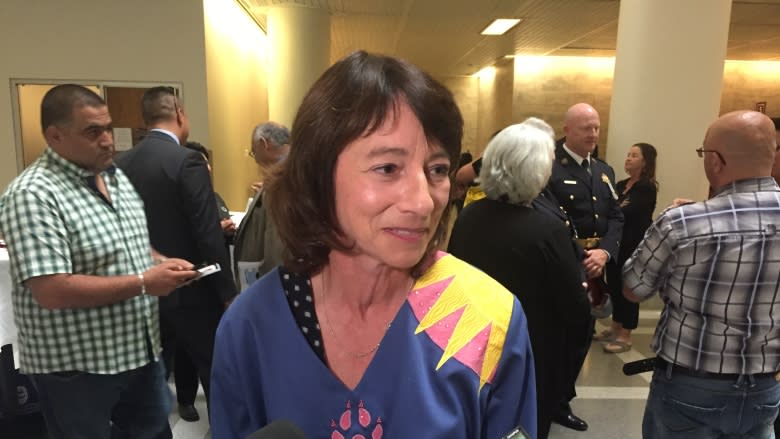Ottawa's Indigenous peoples court shows some early success
Twice a week, at the beginning of each session of Ottawa's Indigenous peoples court, Greg Meekis lights sage in an abalone shell and wafts it through the courtroom with two eagle feathers.
He moves around the judge's bench, the prisoner's box, the lawyers and the clerks.
Then Meekis, a bail supervisor with the Odawa Native Friendship Centre, gives a nod and court begins.
It's been six months since this scene started playing out in Ottawa courtrooms, and smudging is just one of the differences introduced when the specialized court was brought in Sept. 11, 2017.
Diversion programs
The court doesn't handle trials, but does plea and bail hearings, adjournments and sentencings.
Its goal is to incarcerate fewer Indigenous people and instead have them deal with the issues that brought them to court through diversion programs.
Indigenous support workers like Meekis are right there in court, offering context to justices of the peace and lawyers, and then following through with the accused to help keep them on track.
The accused is also given more opportunity to speak and family members can also weigh in, setting a different tone.
'It made me feel more comfortable'
For people like 30-year-old Shaun Michael, that tone was a welcome change. Michael is originally from Nunavut, but now lives in Ottawa.
He has, by his own description, "a big bad record," with most of his charges relating to stealing alcohol and getting in fights.
Last November, he appeared before the court and said he noticed the difference right away.
"It made me feel more comfortable. In the beginning we got to smudge and that can clear our spirit," he said. "Our workers are there, our Indigenous workers. It's a bit [more] lenient sentencing."
The court hands out different sentences than regular courts would for non-Indigenous offenders, ranging from healing circles to serving the community, volunteering, or being required to participate in various programs.
In Michael's case it was weekly bail check-ins, addictions counselling and an Inuit healing program.
No get-out-of-jail-free card
However, "lenient" isn't a word Meekis would use to describe the kinds of sentences the court hands out.
"[The court] requires a person to look inside themselves and say, 'All right, I'm ready to deal with this.' That's not easy at all," he said.
The presiding justice agrees.
"This is not a get-out-of-jail-free card," said Célynne Dorval. "Being forced to deal with your issues, to be able to move forward, is not an easy task. I am sure that most offenders would say it would be easier to do some time in jail."
Recidivism unknown
But how much the court is really paying off won't become clear for some time.
They need to wait and see how many people going through the system wind up in front of the judge again on new charges, Dorval said.
One who hasn't been back yet is Michael. According to court records, he hasn't returned since his appearance in November. He said he has plans to train as a chef and to volunteer by helping out other Indigenous people.
So far, Dorval said 50 people have pleaded guilty, and that there have been 30 bail hearings and hundreds of appearances — though a single charge may require more than one appearance by the accused before their case is dealt with.
But the court has been busy enough that she's hoping to add in another weekly session.
It's funded through the Ministry of the Attorney General, Aboriginal Legal Services and legal aid. Ontario has committed an additional $13.3 million over the next three years to expand the program.



